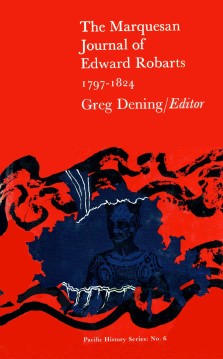|
The
Marquesan journal of Edward Robarts, 1797-1824 / ed. with an
introduction by Greg Dening. - Canberra : Australian national
university press, 1974. - XVI-360 p. :
maps ;
23 cm. - (Pacific history series, 6).
ISBN
0-7081-0635-8
|
PUBLISHER'S
DESCRIPTION :
Edward Robarts was among other things whaler, beachcomber, Tahitian rum
producer, Tuamotuan pearler, butler in Penang, gardener and policeman
in Calcutta. He deserted his ship in 1798 in the Marquesas, and lived
there as a native, where he was adopted by the chiefly families,
married a chief's daughter and faught in battle as Marquesan warrior.
He spent longer in the islands than did most eighteenth-century
beachcombers, and got to know more about Polynesian society than did
most other early observers.
After
leaving the Marquesas [in 1806] Robarts was employed in Penang as
butler to a relative of the Raffles
family. Raffles introduced him to Dr Leyden, under whose patronage he
wrote this Journal. Now published for the first time, it is as Robarts
wrote it, although Professor Dening has made some minor concessions to
readability, as well as providing the invaluable introduction and
annotations.
Robart's
account of his Marquesan life is the
single richest source of material yet published on this least known and
understood of all Polynesian people. The scholar will find that
Robart's ethnography modifies some later preconceptions about the
Marquesas, and throws new light on the process of cultural change in
the Pacific. For the general reader the book is an enthralling
autobiography of a common man who led a most uncommon life.
|
|
GREG
DENING : Robarts's
Journal is important, not because it is an accurate and full account of
Marquesan society ; it is neither accurate nor full. Nor is it
important because he was an insightful observer. As an observer he had
severe limitations. He was introverted ; his journal was not
strictly an account of the Marquesas islands, it was the story of
Robarts's reactions to the peculiar circumstances of his life. His
grasp of the language was quite limited. For example, his memory of
European names and ships was exact, but he gives only a few Marquesan
names. His final account of Marquesan culture is slight and
superficial, if compared with any ethnographical account of simple
societies. And he suffered the limitations of most cross-cultural
observers : he saw a different Marquesan world as if it was a
distorted reflection of a more familiar world.
Robarts's
defects
as an observer do not destroy his value ; they only limit it.
He
had the supreme advantage of having been there. He did not write a
dissertation, for instance, on the social function of Marquesans chiefs
or on the role of Marquesan women. He tells us directly and indirectly
with the particularity of experience what he saw chiefs do and what he
saw women do.
☐ Introduction,
p. 25
|
| CONTENTS |
Foreword
by H. E. Maude
Introduction by Greg Dening
THE
JOURNAL
- Atlantic
and Pacific Oceans
- Tahuata
- Hiva Oa
- Nukuhiva
- Departure
- Tahiti,
the West Pacific, and Penang
- Calcutta
and Botany Bay
- The
Marqueasas (sic) Isles
- A long and
singular career
Vocabalry (sic) of the
Marqueasas Language
Appendix I : A letter of Edward Robarts to James Hare
Appendix II : The Families of Marquesan Chiefs |
|
| COMPLÉMENT
BIBLIOGRAPHIQUE |
- « The
Marquesan journal of Edward Robarts, 1797-1824 » ed.
by Greg
Dening, Honolulu : University press of Hawaii, 1974
- «
Journal marquisien, 1798-1806 » trad. par Jacques Iakopo
Pelleau, Papeete : Haere pō, 2018
|
- Elena Govor, « Twelve days at Nuku Hiva : Russian encounters and mutiny in the South Pacific », Honolulu : University of Hawai'i Press, 2010
- Christophe
Granger, « Joseph Kabris, ou les possibilités d'une
vie, 1780-1822 », Paris : Anamosa, 2020
- Adam von Krusenstern, « Voyage
autour du monde : la première expéditione maritime
russe autour du monde à bord de la Nadiejeda et la Neva,
1803-1806 » (1812), Besançon : La Lanterne magique, 2012
|
|
|
| mise-à-jour : 20 avril 2021 |
 |
|
|
|